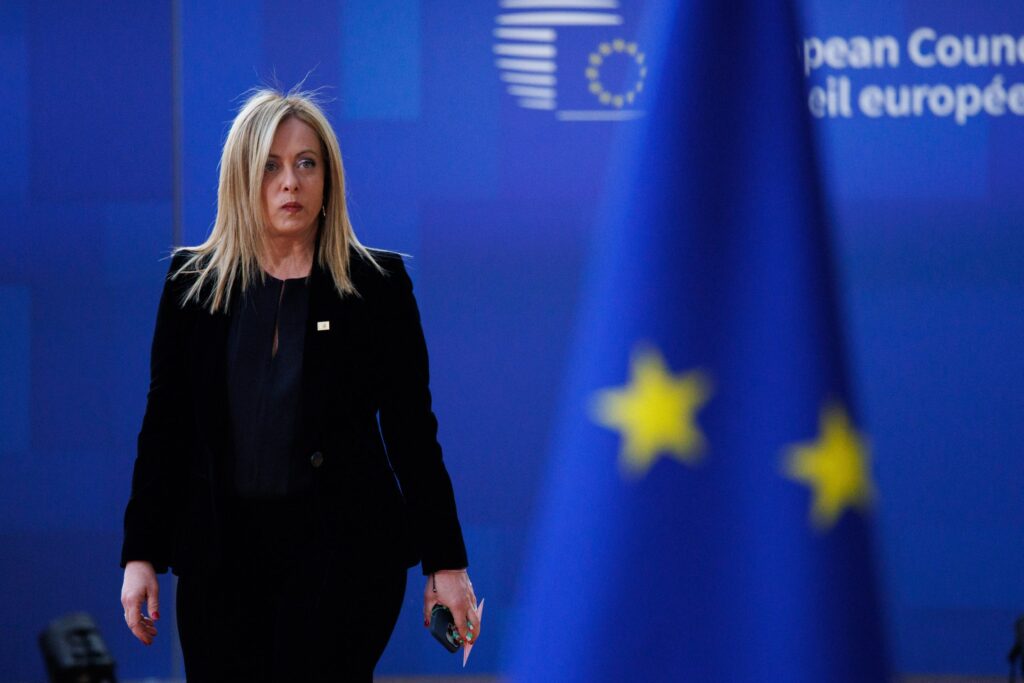Donald Trump’s re-election as US president is a devastating shock to Europe, which is woefully unprepared. His promised protectionism threatens the European Union’s struggling export-led economies, and his transactional attitude toward NATO endangers Europe’s already feeble security. Ukraine could soon be sacrificed to Russia, and by emboldening nationalist fellow-travelers such as Hungarian Prime Minister Viktor Orban, Trump may cause EU unity to be further undermined from within.
Shell-shocked Europeans will be tempted to hunker down and hope that Trump does not make good on his most extreme policies: slapping blanket tariffs on European exports, abandoning Ukraine and quitting NATO. But this would be a catastrophic mistake. Europeans must swallow their pride and try to win Trump over.
There is some hope in Trump being unpredictable, inconsistent and susceptible to flattery. He often stakes out aggressive positions as a negotiating strategy, the goal of which is to clinch a deal that he can trumpet as a victory. He craves admiration and respect, and he hates looking weak. Europe’s strategy should capitalise on these features of his personality.
Three points stand out. First, personal diplomacy is paramount. The worst way to engage with Trump is to rely on bureaucratic, policy-oriented, rules-focused EU institutions. Instead, European leaders need to establish positive personal relations with him—just as Japanese Prime Minister Shinzo Abe did just after Trump won the 2016 presidential election.
The ideal person for this task is Italy’s right-wing nationalist prime minister, Giorgia Meloni. She shares Trump’s hostility to illegal immigration and his professed conservatism on social issues. Already a star in the eyes of American conservatives, she has also been lionised by Elon Musk, who has aligned himself fully with Trump.
But Meloni has also acted pragmatically as prime minister, advancing Italian interests through cooperation within EU circles, rather than in opposition to them. She has also been hostile to Russian President Vladimir Putin and supportive of Ukraine. And with her party enjoying strong backing from small businesses, she is vocal in defending Italian export interests. Meloni’s mission should be to build a rapport with Trump and emphasise the common ground they share.
Second, the EU should give Trump immediate policy wins on trade and defense. Meloni should come bearing gifts, not least a plan to boost US exports to the EU. Trump views the EU’s large trade surplus with the US as unfair, and his proposed solution is to impose sweeping (10 percent or even 20 percent) tariffs on EU exports.
Since the US is the EU’s largest export market—goods exports to the US reached €500 billion in 2023, one-fifth of the bloc’s total—the sluggish European economy is vulnerable to US protectionism. Moreover, since US goods exports to the EU are only €350 billion, and since Trump does not need to worry about re-election, EU retaliation is unlikely to be effective. The best option, therefore, is to try to forestall Trump’s tariffs by unilaterally opening EU markets to US exports.
The other big policy win that Europeans should hand Trump is a commitment by European members of NATO to raise defense spending to 2.5 percent of GDP next year, and to 3 percent by the end of Trump’s four-year term. Doing so is desirable in any case. Europe is vulnerable to Russian aggression because it cannot defend itself. That is why far-sighted countries, notably Poland, have already hiked up defense spending since the invasion of Ukraine in 2022.
Boosting European defense spending would be a hedge against Trump’s suggestion that he will not help defend European countries that don’t spend enough on defense, or that he would withdraw the US from NATO altogether. With luck, a big move by European countries would avoid such a calamity.
Given how little Italy spends on defense, Meloni may not be the ideal person to deliver such a message. The better spokesperson on this issue is NATO’s new secretary-general, Mark Rutte, who maintained good relations with Trump during his first term, when Rutte was the centre-right prime minister of the Netherlands.
Finally, Europeans must appeal to Trump’s vanity to try to save Ukraine. President Joe Biden’s administration and its European allies have sought to fast-track aid to Ukraine to mitigate the threat of a Trump victory, and European countries ought to continue supporting Ukraine in any case. But Ukraine’s faltering war effort will obviously suffer without US aid. Trump’s re-election will have set off alarm bells across Ukraine. He has talked of cutting off US support and ending the war within 24 hours, implying that he will force Ukraine to abandon the territory it has lost and remain vulnerable to future Russian aggression.
But Trump is obsessed with looking strong, not least in the eyes of other strongmen such as Putin and Chinese President Xi Jinping. So, Meloni should make the case that abandoning Ukraine would make him look weak. It would be better for him to stand up to Putin and bring the war to an end in a fairer way, thus solidifying his status as the dealmaker-in-chief. Useful allies here could include Mike Pompeo, Trump’s former secretary of state and potentially his new defense secretary, who also advocates a tough line in support of Ukraine.
It is easy to find reasons why this strategy might fail. Trump is mercurial, Meloni might change her tune with respect to the EU and Ukraine now that he is in power, and European governments are divided and generally quite timid. EU institutions are weak but also protective of their negotiating privileges. Orban may urge Trump to pursue a different strategy. Even so, Europe needs to try, because the alternatives are terrifying.

